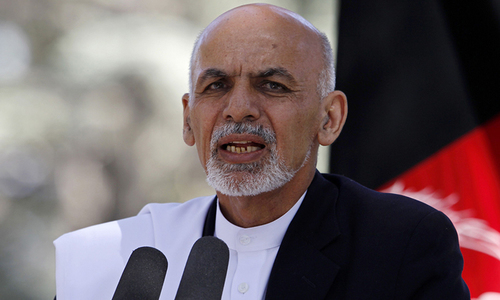KARACHI: As Russia has convened another meeting on peace in Afghanistan, Pakistan needs to ask Russia and Iran what assistance these countries could offer to counter the growing threat of the militant Islamic State group and other elements in the landlocked country to bring peace and stability in the region, said former foreign secretary Najmuddin A. Shaikh at a session of the 8th Karachi Literature Festival on Saturday.
The session titled ‘Afghanistan-Pakistan: illusions and realities’ had Mr Shaikh, who has served as ambassador to the United States, Iran and West Germany besides working as a special envoy in several other countries, in conversation with journalist and writer Ahmed Rashid, author of five books, including Taliban.
Both Russia and Iran did not want to see IS gain a foothold in Afghanistan, whose over 38 per cent territory at present was controlled by the Afghan Taliban, said the former foreign secretary.
This time Afghanistan, too, has been invited to the meeting being hosted by Moscow in the middle of this month while the Russian foreign secretary has insisted on the inclusion of the Taliban in the dialogue process. At the moot, Pakistan, he said, must also offer its expertise and assistance in bringing peace to Afghanistan. Besides, the impact of instability in Afghanistan, drug trafficking, and Afghan refugees on Pakistan’s economy must be taken into consideration, he added.
Stability in Afghanistan was a precondition for stability and progress in Pakistan, he said. While there was fragmentation in the Taliban with a few disgruntled elements joining IS and other militant groups, the Afghan government had held talks with the Taliban leadership at their Qatar office which was still operational, he said. “Fragmentation in the Taliban can be very dangerous,” he said, adding that the regional powers had a fair idea of its repercussions. In this scenario, he said, the Qatar office could be approached to bring the Taliban to dialogue.
Ahmed Rashid said the China-Pakistan Economic Corridor (CPEC) demanded stability in the region. “Our future depends on the success of CPEC,” he said. Although Pakistan’s military establishment was raising a division for the security of the corridor passing through the country, China was well aware of the fact that a political settlement was necessary for long-term stability, he said. Realising the importance of political settlement, the country was interested in playing a role in negotiating peace talks, he said.
However, Mr Shaikh argued, there were elements in Kabul which did not want stability in Afghanistan as the prevailing chaos allowed them to take benefit of poppy cultivation and do narcotics business. Pakistan had suffered huge losses on several fronts because of the elements which were always there to sabotage peace talks, as they had done in July 2015 by spreading media reports about Mullah Omar’s death during the talks with the Taliban, the ex-secretary said.
In reply to a question, he said it was not clear if the US policy on Afghanistan’s security would remain unchanged or the Trump administration would withdraw the huge funds being spent on Afghanistan’s security. The US had already wasted billions of dollars in Afghanistan without success. However, he believed, the withdrawal of such huge funds would lead to chaos.
Mr Rashid said the civilian government in this country remained completely out of the picture as far as foreign policy was concerned. He said there had been no input of the civilian government in foreign policy of Pakistan. He said a fundamental change is required in the thinking of the military that reviewed past policies after the attack on the Army Public School in Peshawar. However, he agreed with a questioner that the present government did not seem interested in or capable of making foreign policy. The failure of the government to appoint a foreign minister indicated their lack of seriousness, he said.
But Mr Shaikh disagreed with the opinion that the civilian government’s input had never been sought by the military while making foreign policy and said that the input of the civilian government had always been there.
Published in Dawn, February 12th, 2017













































